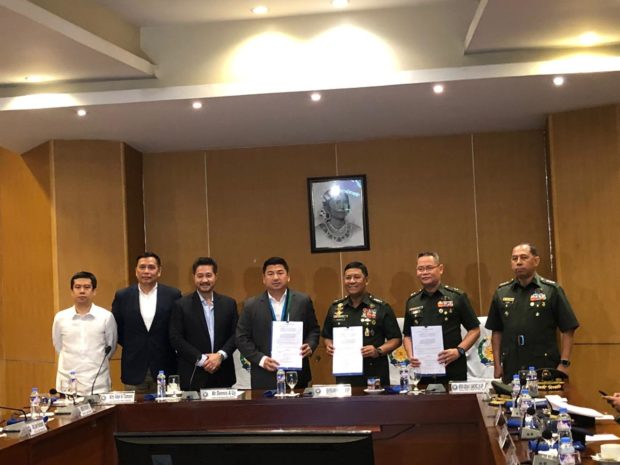
In this September 11, 2019 photo, the Armed Forces of the Philippines and Dito Telecommunity Corp. (former Mislatel) present their signed Memorandum of Agreement that allows the new telco to build its communications facilities in military camps and installations. INQUIRER.net/Frances Mangosing
MANILA, Philippines — A China government-linked telecommunications firm operating in the Philippines could pose “irreversible consequences” to national security, an intelligence official has warned.
“This is a recipe for disaster,” said the official, who is well aware of China’s interferences on the Philippine military’s cyber domain. He expressed his worries on the looming threat to national security with the entry of the Chinese-backed telco in the country especially since the Philippine military recently forged an agreement allowing it to set up communications equipment on military camps.
The Armed Forces of the Philippines (AFP) has faced a backlash when it entered into a memorandum of agreement (MOA) with Dito Telecommunity Corp. (former Mislatel), the country’s third telco player, on September 11.
READ: PH military to allow Chinese-backed 3rd telco to build in camps
State-owned China Telecom owns 40 percent of the consortium controlled by Davao-based businessman Dennis Uy, a close friend of President Rodrigo Duterte.
“This will transcend administrations. If we messed up, how can we recover?” the official told INQUIRER.net on the condition of anonymity to be able to speak freely.
He said China’s ambition is to dominate both the maritime and cyber realm, as it continues to fight for world power. Chinese state-owned firms are obliged under Beijing laws to follow orders, like divert or intercept internet traffic, or access state secrets, when required.
“A teenager is capable of hacking our system. How much more a state-sponsored cyber warfare?” the intelligence official pointed out.
Several countries including Australia, United States, Japan, Taiwan, and New Zealand have banned or reconsidered business deals with China’s largest telco and phone manufacturer Huawei Technologies due to suspicions of potential Chinese state espionage.
The Philippines, the official said, has weak cyber defenses and is not ready for complex challenges: “When you compare it to basketball, we can only play with amateurs and not a professional league like FIBA World Cup because we lack equipment.”
“Even the US is not prepared, their 2016 elections were undermined. How much more on us? Our country is not prepared to fight this kind of war,” he pointed out. “If the US cyber system – the most advanced cybersecurity in the world – can be penetrated, what more for our country?”
“We were hacked many times and our government websites went down. But we’ve done nothing,” he added.
The Philippines also continues to have a maritime dispute with China over the West Philippine Sea, despite warming relations of the two countries after President Rodrigo Duterte came to power. Filipinos have a high public distrust of China as shown by surveys in recent months.
“We cannot even fully guard the West Philippine Sea, even more so our cyber domain,” the official emphasized.
“Would China be fool enough to say, ‘We’re going to hack you’? Once we are attacked by advanced persistent threats and malware, we will be taken hostage,” he further warned.
Dito Telecommunity was awarded the license to operate last July after other bidders were disqualified.
Atty. Adel Tamano, chief administrative officer of Dito, assured the public last week that the telco company will protect the national and cybersecurity interests of the Philippines.
As a Filipino company, he said Dito “will never allow any country to violate our national and cybersecurity.”
The entry of the third telco player in the country was envisioned to break the duopoly enjoyed by PLDT-Smart and Globe. Dito is expected to roll out its services in late 2020 and will also partner with other government agencies.
Under the 10-page agreement signed on September 11, Dito will “co-locate some of its microwave relay and base transceiver stations for mobile communications services and equipment with that of AFP.”
The military said they have the same existing arrangements with Smart and Globe and emphasized that the consortium passed through government scrutiny to do business in the Philippines.
But the intelligence official said the prevailing similar arrangements of AFP with Smart and Globe should not serve as a basis to let the agreement with Dito get through easily, pointing out that the two telco firms are not involved with China.
The MOA between AFP and Dito is still subject to the approval of Defense Secretary Delfin Lorenzana, who was on official travel abroad and was unaware of the deal when it was signed. /kga
RELATED STORY
Lorenzana unaware of AFP’s deal with China-linked telco – Palace